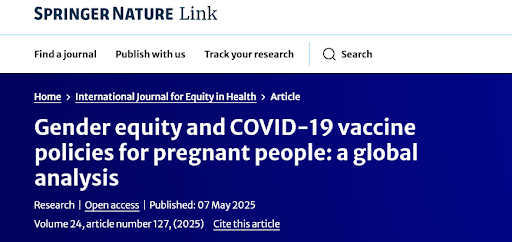GovEx Senior Research Data Manager Andrew Nicklin, working with a group of colleagues from across Johns Hopkins University, recently published research examining how national levels of gender equity influenced COVID-19 vaccine policy for pregnant people.

The study, published by the International Journal for Equity and Health, analyzes vaccine policy data from 224 countries between May 2021 and January 2023. By comparing this data with countries’ Global Gender Gap Index scores, income levels, and access to mRNA vaccines, the researchers found that countries with higher levels of gender equity were more likely to adopt permissive vaccination policies for pregnant people earlier in the pandemic.
The report concludes that, to counter cultural biases, pregnant people must be included not only in the research phase of vaccine development, but in the rollout as well.
“[A]s is the case with gender inequities in health and well-being more broadly,” it reads, “our findings suggest that pandemic vaccine policies also may be rooted in deeply embedded cultural biases and unfair patterns of power that need to be addressed if fairness for pregnant people in pandemic response is to be secured.
This marks the first global study to examine the relationship between gender equity measures and maternal immunization policies.



